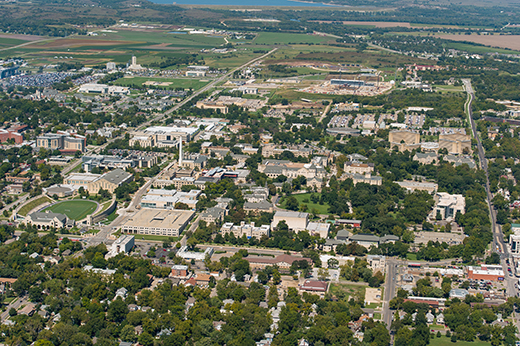THE HOT ZONE connects with university's long history as 'Silicon Valley for biodefense'
Thursday, May 23, 2019

This aerial view shows Kansas State University's Manhattan campus, which has been called the "Silicon Valley for biodefense" for its research to protect the nation's food supply and fight bioterrorism. | Download this photo.
MANHATTAN — For more than 150 years, Kansas State University has been a national leader in animal health, biosciences and food safety research.
It is a mission that harkens back to the university's land-grant beginnings and it is a mission that former Senate Majority Leader Tom Daschle highlighted in 2017 when he described Kansas State University as the "Silicon Valley for biodefense."
Now the university and its leaders are again being highlighted for their biodefense efforts. Two Kansas State University veterinarians and leaders — Nancy and Jerry Jaax — and their response to an Ebola-related outbreak have inspired the upcoming National Geographic limited series, THE HOT ZONE. The series premieres at 8 p.m. on Monday, May 27.
"Nancy and Jerry Jaax are leaders who expanded the university's land-grant mission through their work and expertise in biodefense," Ron Trewyn, the university's NBAF liaison said. "From their work with the U.S. Army at Fort Detrick to their work with researchers in Manhattan, Nancy and Jerry helped make K-State the 'Silicon Valley for biodefense.'"
In 1999, Jerry helped Kansas State University publish the "Homeland Defense Food Safety, Security, and Emergency Preparedness Program." The 100-page document — informally called "The Big Purple Book" — outlined the university's infectious disease research programs and the need for a facility to address three major infectious disease components: plant pathology, animal health and food processing.
That led to the creation of Kansas State University's biocontainment facility called the Biosecurity Research Institute, or BRI, at Pat Roberts Hall. Both Jerry and Nancy played key roles in the development of the institute and Nancy inspired the need for a training lab based on her experience with Ebola.
Jerry and Nancy also assisted in winning the national competition for the federal National Bio and Agro-defense Facility, or NBAF, which is under construction north of the university's Manhattan campus and will replace the aging Plum Island Animal Disease Research Center in New York. Once NBAF becomes operational in 2022-2023, it will be America's foremost animal disease research facility.
As the "Silicon Valley for biodefense," Kansas State University maintains numerous facilities, research collaborations and academic programs devoted to agrodefense and biodefense, including the following list:
• The College of Veterinary Medicine.
• The College of Agriculture.
• The National Agricultural Biosecurity Center, or NABC.
• The Food Animal Residue Avoidance Databank, or FARAD.
• The K-State Plant Disease Diagnostic Lab, part of the Great Plains Diagnostic Network.
• The Biosecurity Research Institute, or BRI.
• The federal National Bio and Agro-defense Facility, or NBAF.
• The Kansas Department of Agriculture.
• The U.S. Department of Agriculture's Center for Grain and Animal Health Research, which is home to several research units in Manhattan: the Arthropod-Borne Animal Diseases Research Unit, the Grain Quality and Structure Research Unit and the Hard Winter Wheat and Genetics Research Unit.
Learn more about Kansas State University as the "Silicon Valley for biodefense."
